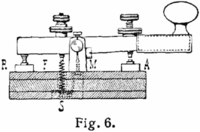Z code

Z Code (like Q Code and X Code) is a set of operating signals used in CW, TTY and RTTY radio communication.
Distinct versions
There are at least three sets of Z codes.
1. One set of codes was originally developed by Cable & Wireless Ltd. (the Cable & Wireless Service Z code) for commercial communications in the early days of wire and radio communications. Many of the old C&W codes are derived from mnemonics
- (ZAL = alter wavelength,
ZAP = ack please,
ZSF = send faster, etc.)
The old C&W Z codes are not widely used today.
2. APCO[clarification needed] also developed a system of Z codes.[1] 3. NATO forces independently developed a later set of Z codes for military use and inter-language needs. The NATO Z codes are still in use, and are published in the unclassified document ACP-131. - (ZAL = alter wavelength,
There are other sets of codes internally used by Russia's military and other operating agencies.
Examples
Some example Z codes Code Meaning Source ZAL (...) ... I am closing down (until ...) due to ... C&W ZAP ... Work ... - 1. Simplex;
2. Duplex;
3. Diplex;
4. Multiplex;
5. Single sideband;
6. With automatic error correction system;
7. Without automatic error correction system.
8. With time and frequency diversity modem
C&W ZBK Are you receiving my traffic clear? NATO ZBK 1 I am receiving your traffic clear NATO ZBK 2 I am receiving your traffic garbled NATO ZBM 2 Place a competent operator on this circuit C&W ZLD 2 I cannot transmit pictures C&W ZSF ... (...) Switch off ... (except ...) - 1. IFF;
2. IFF sets for 10 minutes in area denoted except for ships with the following call signs ...
C&W ZBW ... Change to backup frequency ... C&W ZBZ ... Measure of printability - 1=Garbled / unreadable, up to 5=Perfect
C&W ZUJ Stand by. NATO - 1. Simplex;
See also
References
- ^ "Standard Z Signals". APCO International Historical Collection (apcohistory.org).
